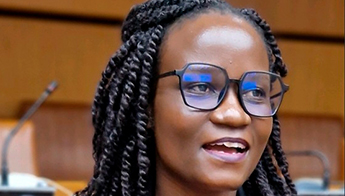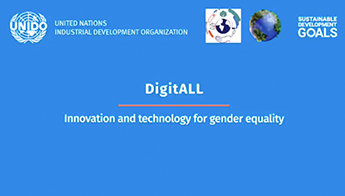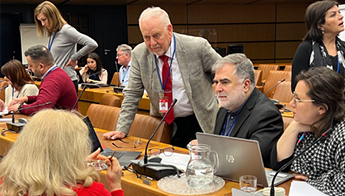
Share this:
Welcome to the UNIDO Montreal Protocol Newsletter
Welcome to the tenth issue of our newsletter. We are delighted with the findings of the recent UN report ‘Scientific Assessment of Ozone Depletion 2022,’ which indicates that the ozone layer is on its path to recovery, thanks to the success of the Montreal Protocol. UNIDO actively works with Member States to reach the phase-out targets of harmful substances that damage the environment. Our feature story highlights the achievements of UNIDO over the last few years in this area.
UNIDO’s Deputy to the Director General and Managing Director Ciyong Zou’s meeting with the Secretariat of the Multilateral Fund (MLF) for the implementation of the Montreal Protocol, as well as UNIDOs future in the area of environment are covered in the Ask UNIDO section.
The New Year at UNIDO’s Montreal Protocol Unit started with a Kigali Implementation Plan workshop for Balkan countries and Türkiye, where the participants were provided with necessary technical tools to devise their national plans in line with the Kigali Amendment to the Montreal Protocol.
Niger submitted the first ever Kigali Implementation Plan (KIP) that will help the country comply with the requirements under the Kigali Amendment, which is a pioneering and a forward-looking step. We discuss with the National Ozone Officer of Niger, Ali Seydou Moussa and an International Technical Expert, Bassam Elassaad, the factors leading to the plan in our interview section.
If you have questions on the work we do, please submit your queries via the form at the bottom of the page. We will gladly answer in the “Ask UNIDO” section of the coming issue. We would love to hear your feedback on our newsletters. Catch up on the latest from our LinkedIn and Facebook channels.
Happy reading!
Your UNIDO Montreal Protocol Unit Team
ASK UNIDO
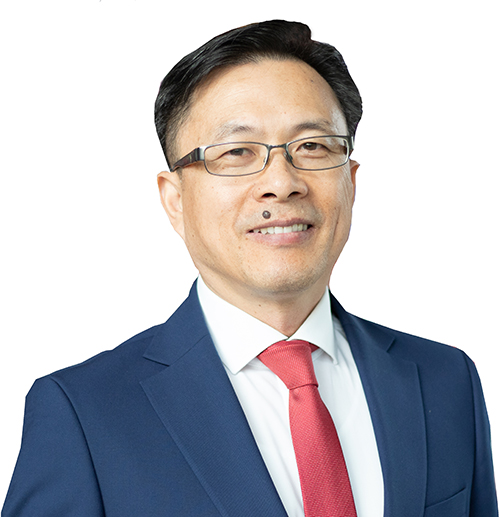
Ciyong Zou
On the priorities of the Organization as one of the implementing agencies of the Montreal Protocol and the latest developments.
INTERVIEW
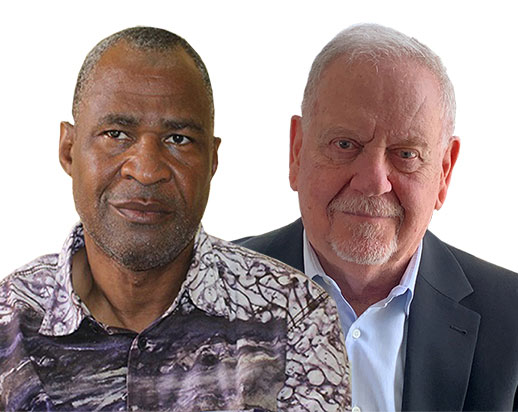
Ali Seydou Moussa | Bassam Elassaad
In 2022, Niger requested UNIDO to prepare and submit on their behalf the first Kigali HFC Implementation Plan – prior to the approval of cost guidelines. What were the driving factors behind this?
READ MOREFEATURE ARTICLE

Jayaraj Manepalli
UNIDO helps reduce 133 MT of CO2 emissions in 2022: Reaches a billion-dollar milestone on ozone and climate action.
QUIZ - Did you know?

Test your knowledge!
HFC is an abbreviation of what substance?
What are the three organic compounds found in HFCs?
What is the ozone depletion potential of HFCs?
What is the global warming potential of the refrigerant HFC-134?
What happens when HFCs absorb sunlight and solar radiation that is reflected by earth’s surface?
In which amendment were HFCs added to the controlled substances of the Montreal Protocol?
NOTICE BOARD
Spotlight
International Women’s Day 2023
Achievements of women in the field of environmental protection and
climate change.
An interview with UNIDO MPU’s International expert in the field of
cooling, Mary Najjuma, published on a website highlighted her journey.
Social Media
UNIDO’s Montreal Protocol Unit has created a video to commemorate
the International Women’s Day 2023. The video includes activities
undertaken by some countries where MPU projects are active.
Events
Kigali Implementation Plan workshop in Vienna
A two-day workshop on 'Kigali Implementation Plan and Development – Approach and Experiences' was held on 25-26 January 2023 for countries from the Balkan region and Türkiye at UNIDO headquarters in Vienna.
ASK UNIDO

You Ask, We Answer!
Ciyong Zou, UNIDO Deputy to the Director General and Managing Director, Directorate of Technical Cooperation and Sustainable Industrial Development (TCS) on the priorities of the Organization as one of the implementing agencies of the Montreal Protocol and the latest developments.
UNIDO was represented at the 15th Meeting of the Conference of the Parties to the Convention on Biological Diversity (CBD COP 15) in Montreal. What was UNIDO’s main message conveyed?
The message conveyed at the CBD COP 15 was that UNIDO is strongly committed to work with all the other stakeholders—UN agencies, private sector and civil society towards the implementation of the Kunming-Montreal Global Biodiversity Framework. It does this through supporting its Member States to steer their industries on a path to sustainability, to restore ecosystems and ensure conservation and sustainable use of biodiversity. These are embedded in UNIDO’s mandate to promote inclusive and sustainable industrial development.
Tell us about your recent meeting with Tina Birmpili, Chief Officer of the Multilateral Fund (MLF) Secretariat, and other officials on your visit to Montreal.
While in Montreal to attend the CBD-COP15, I took the opportunity to meet Tina Birmpili, the Chief Officer of the MLF Secretariat and discuss the 30 years’ work of UNIDO under the Montreal Protocol. Tina Birmpili and her team provided their views on the work done so far by all the implementing agencies. They listed the challenges ahead in ensuring complete phase-out of all Ozone Depleting Substances (ODS) by 2030 and the gradual phase down of Hydrofluorocarbons (HFCs). HFCs are the chemicals controlled under the Montreal Protocol–especially the Kigali Amendment–that were introduced as alternatives to the ODS. However, they have high global warming potential and are harmful to the environment.
UNIDO, as the only UN agency mandated to promote inclusive and sustainable industrial development is well suited to address the challenges. We support governments, associations and industries in the transition towards environmentally-friendly alternatives. We can confidently say that in the past 30 years, with the projects implemented under the Montreal Protocol, we have transformed industries globally and in particular the refrigeration, air-conditioning and foam sectors.
During my trip, I also had bilateral meetings with the CEO and Chairperson of Global Environment Facility (GEF), Executive Secretary of the Minamata Convention Secretariat and the Executive Secretary of the of the Basel, Rotterdam and Stockholm Conventions. UNIDO is also implementing projects funded by GEF and under the Basel, Rotterdam, Stockholm and Minamata Conventions. Together with the work done under the Montreal Protocol, and the collaboration with UNIDO’s expertise in various technical areas, excellent synergies can be achieved for the countries and their sustainable industrialization.
What were the major funding requests submitted to the MLF Secretariat? How does it affect UNIDO’s project portfolio?
During 2022, the MLF Secretariat received 233 funding requests submitted by different bilateral and implementing agencies, including UNIDO. These requests were forwarded to the Executive Committee’s review and approval. Out of these, 218 projects in 95 countries were approved by the Executive Committee. These approvals include 106 projects related to Hydrochlorofluorocarbons (HCFC) phase out, 58 Hydrofluorocarbons (HFC) related projects, and 54 projects of other categories.
As one of the four implementing agencies of the Montreal Protocol, UNIDO plays an active role in addressing climate change and promoting a sustainable industrial development. Progress by innovation is our motto. UNIDO has implemented MLF-funded projects in over 100 countries. We are carefully planning, together with the national counterparts, the projects submitted to the MLF and their linkages to other cross-cutting areas such as circular economy, climate action, industry 4.0, gender, youth and partnerships.
Are there any pivotal policy decisions the MLF Executive Committee has taken in the latest meeting as briefed to you by the MLF team? You might have already been apprised of it by UNIDO’s technical team that participated in the MLF Executive Committee meeting.
The meeting of the MLF Executive Committee has decided to place emphasis on four areas:
- Cost guidelines for the phase down of HFC;
- Support for institutional strengthening (IS) projects;
- Preparation of national inventories of banks of unwanted controlled substances and
- Agreement on criteria for energy efficiency projects.
The cost guidelines for the HFC phase down are of crucial importance both for the countries and for implementing agencies. Once the MLF Executive Committee prepares these cost-guidelines, UNIDO is ready to submit project proposals for more countries that have already ratified the Kigali Amendment.
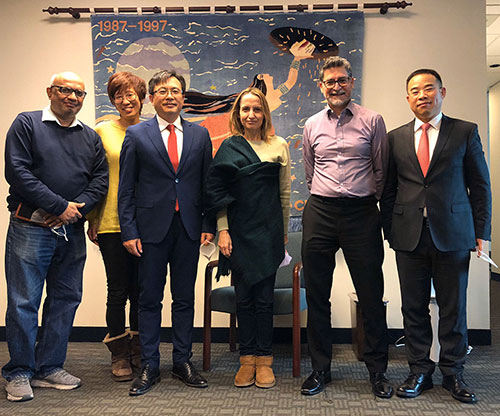
UNIDO Deputy to the Director General and Managing Director Ciyong Zou with MLF Secretariat Chief Officer Tina Birmpili and team at the meeting in Montreal.
With the increased IS funding, UNIDO can support more Member States in meeting their additional obligations from now until 2030. By this time, the countries are required to ensure complete phase-out of ODS substances, while at the same time be able to control the use of HFCs, alternatives to ODS with high global warming potential (GWP). Maintaining national inventories of banks of unwanted controlled substances will help countries understand how to deal with the end of the life cycle of the ozone depleting chemicals. And last, but not least, the introduction of low GWP alternatives goes hand in hand with the improved energy efficiency of industries – an area in which UNIDO’s in-house knowledge and experience can be of great significance.
How has UNIDO performed so far in the implementation of the Montreal Protocol projects?
Since the establishment of the Multilateral Fund for the Implementation of the Montreal Protocol (MLF) in 1990 and UNIDO becoming an implementing agency subsequently, it has been an active partner. UNIDO utilized its expertise in promoting the phase-out of ozone depleting substances (ODS). UNIDO activities under the Montreal Protocol during 2022 led to a reduction of 133 million metric tons of CO2 equivalent emissions, which is equivalent to the reduction of emissions from 28.7 million passenger vehicles driven in a year. UNIDO reached another milestone in 2022—funding from the MLF crossed USD 1 billion so far (including the agency support costs) to implement projects around the world. In this way, UNIDO helps countries improve their policies and legislation, strengthen their monitoring systems, equip national technicians with needed skills for the future. This enables a transformation in the way industries are working, leading to an inclusive and sustainable industrial development.
UNIDO is known for its implementation of international treaties related to environment. How does it supplement the work under the Montreal Protocol?
UNIDO supports countries in their environmental management efforts, including the implementation of multilateral environmental agreements. UNIDO aims at resource-efficient industrial production, elimination of persistent organic pollutants, phasing-out of ozone-depleting Substances (ODS) in line with all international agreements and treaties. The Montreal Protocol unit is at the forefront of UNIDO’s efforts towards assisting the Member States in fulfilling the phase-out targets of the ODS as per the existing treaties.
By incorporating the requirements of multilateral environmental treaties and the Agenda 2030 especially the Sustainable Development Goal (SDG) 9, UNIDO works towards promoting an inclusive and sustainable industrial development.
What are the future plans of UNIDO, especially the work under the Montreal Protocol ?
UNIDO continues to implement the projects and programmes approved so far by the MLF. Simultaneously, it prepares pipelines and proposals for new initiatives, utilizing the new funding windows and assists countries on their way to implement the requirements of the Kigali Amendment to the Montreal Protocol.
In December 2022, the MLF Secretariat reviewed the first ever Kigali HFC Implementation Plan (KIP). This project was submitted by UNIDO for Niger. This was a pioneering step both from the side of Niger and from UNIDO. The MLF Executive Committee acknowledged the hard work put together by UNIDO and Niger behind this proposal, responded positively and approved the funding to initiate the work.
Over 140 countries have ratified the Kigali Amendment so far—bringing together joint global efforts to combat climate change and contribute towards the objectives of the Paris Agreement. UNIDO stands ready to support them in their efforts towards meeting the climate targets.
INTERVIEW

Interview with Ali Seydou Moussa and Bassam Elassaad
Ali Seydou Moussa, Director General of Environment and Sustainable Development, Ministry of Environment and Fight against Desertification, Government of Niger and Bassam Elassaad, Technical Expert, on the development of the Kigali HFC Implementation Plan (KIP) for Niger.
In 2022, Niger requested UNIDO to prepare and submit on their behalf the first Kigali HFC Implementation Plan – prior to the approval of cost guidelines – what were the driving factors behind this?
Niger is highly committed to the phase-down of hydrofluorocarbons (HFCs) as it ratified the Kigali Amendment on 29 August 2018. It also initiated a wide range of preparatory activities for the HFC phase-down. The National Ozone Unit (NOU) updated the licensing system to include HFCs and their mixtures in December 2020. The NOU then reviewed the policy options that would facilitate the phase-down of HFCs, to define short-term measures that could be included in the future strategy. Based on this analysis, the NOU commenced awareness raising and consultation with stakeholders (governmental actors, the private sector, the Association of Refrigeration Professionals (APFN), importers of refrigerants and large workshops) on the development of the KIP. The country was then well placed to begin the first phase of its HFC phase-down plan.
Article 5 parties that have ratified the Kigali Amendment are required to implement an HFC consumption freeze (at baseline) in 2024 and must achieve a 10% reduction by 2029. Given this timeline, the Government of Niger took the decision to submit the first phase of the KIP in the absence of cost guidelines.
What was the process for the development of the KIP Stage I proposal?
When Niger began working on the KIP in early 2022, there were no cost guidelines and little guidance existed, beyond the recommendation to limit the duration and funding of Stage I to 2030. Moreover, the data required for the calculating the baseline, derived from the 2020 to 2022 consumption, was not available since the consumption values for 2022 were unknown.
Niger has always been committed to the Montreal Protocol process; implementing activities in a timely manner, to meet the compliance commitments even in adverse local and global conditions. The NOU team follows up closely with stakeholders to ensure an equitable and fair process in allocating quotas that meet the market requirements, while complying with the phase-out schedule. Through their dedication and presence in every event–whether training sessions or for the disbursement of tools in all regions of the country, the NOU team has gained the trust of various stakeholders.
The KIP preparation process involved periodic consultations through conference calls with the NOU, the national consultants, the technical expert, and the UNIDO management team. The NOU formed a Steering Committee made up of public and private parties to help with the collection of information and the validation of the elements of the strategy. The trust gained by the NOU among the members of the Steering Committee ensured that the exchanges were open and focused on the common benefit of the country.
The KIP covers more substances and includes more sub-sectors than the Hydrochlorofluorocarbons Phase-out Management Plan (HPMP). This added a certain complexity as to what to include in Stage I, which coincides with HPMP Stage II in Niger. It was crucial to include the elements that could not be included in the final Stage of the HPMP due to the limited funding available to Low Volume Consumption Countries (LVC) like Niger. The approach was based on a concept introduced by the Technology and Economic Assessment Panel (TEAP)’s Decision XXXI/1 Replenishment Task Force (RTF) report of 2019. Termed “Maintain and Build” (M&B), the strategy states that the spending on programmes under the HPMP to phase-out HCFCs are maintained while using the KIP Stage I to build on those programmes to phase down HFCs.
The M&B strategy has enabled Niger to prioritize activities according to its needs in three priority sectors: refrigeration, air conditioning and automotive air conditioning.
The main activities for the sectors are:
- Training, including updating curricula;
- Awareness campaigns for industry stakeholders;
- Programs for end users;
- Support for the Association of Refrigeration Professionals in Niger (APFN) and other associations in the refrigeration and air conditioning sector.
In order to engage additional stakeholders in the development of the KIP, the Government of Niger adopted Order No. 0042/MELCD/SG/DGEDD on 22 February 2023 on the creation, attribution and composition of a National Ozone Committee to include other stakeholders involved in HFCs (Energy Sector, Standardization etc.).
For the Parties that are currently collecting data for their KIP proposals, what is the critical information that needs to be collected?
The methodology for collecting information is similar to that under the HPMP or the ODS-alternatives survey conducted in 2017, but is more rigorous. This is necessary to define the history and trends by substance and by sub-sector.
The first element of the data collection process is the pre-preparation stage. The NOU and the Steering Committee worked together to ensure that respondents understood the importance of providing accurate data, necessary for preparing the strategy, and that they would respond honestly and accurately. In particular, it was important to clarify the purpose of the survey and that the results would be used only to determine key decision points, from the national HFC reduction targets to the funding for the projects.
The second element of the data collection process is to prepare a well-designed questionnaire that maximizes the information collected. Redundant data makes questionnaires long and difficult to fill, while unclear questions can lead to confusion and wrong input.
The last element after the collection of data is the analysis stage. Aggregated data needs to be checked against economic indicators and technical ones. For example, on the economic side, the number of domestic refrigerators in the country is mainly a factor of the number of households with access to electricity, while the number of commercial refrigeration equipment is a factor of the number of businesses in the cold chain. On the technical side, the consumption in a certain sub-sector is a function of the leakage rate in that sub-sector plus the amounts used in charging equipment at local assemblers and on site.
Accuracy is critical. Inaccurate data can reflect on the credibility of data presented under Article 7 and in the Country Programme data reports. Exaggerated numbers can easily be challenged, while under-reported data will reflect on the baseline calculations and deprive the country of funding that could otherwise be available.
The essential data required are: socio-economic data, information on the regulatory framework, data on use and consumption, equipment bank, data in the refrigeration servicing sector, vocational and training schools, associations of refrigeration professionals, information on customs, commercial and anti-fraud capacities, and finally, standards and codes. In collaboration with UNIDO, the NOU developed a set of key tools that allow the countries to develop and effectively implement their KIP in view of achieving the objectives of the Kigali Amendment to honour Niger’s commitments to the international community.
What are the key lessons learned from this process and what are your recommendations for the Parties that are now developing their KIP proposals?
The main lessons learned in the preparation of the Niger KIP was the need for discipline in presenting the funding request when little guidance and background was available. There was no template to follow so the team used a mixture of what they termed as “stability and flexibility”. Stability in the sense that irrespective of the project being presented, the Multilateral Fund (MLF) and the Executive Committee (ExCom) expect a certain degree of uniformity. Flexibility, on the other hand, introduces a certain degree of innovation in the approach whenever possible by developing a set of tools to provide justification for various activities proposed for Stage I.
Second, a sectoral approach for budgeting the activities under the KIP provides a good basis for integrating the KIP activities with those under the HPMP and identifies the areas where parallel implementation of activities optimizes operations.
Third, is the need for the prioritization of sectors, another innovation introduced in the Niger project document. Since the baseline calculation is based on tonnes of CO2 equivalent that is equal to metric tonnes multiplied by the Global Warming Potential (GWP) of the substance, the prioritization process is more complex. It has to take into consideration the substance and the sub-sector (or the application) where that substance is used. Under the HPMP, different substances are used for different applications, for example HCFC-141b used in foams while HCFC-22 used in the refrigeration and air conditioning (RAC) sector across all of its applications. Under the KIP, for example, HFC-134a and R-404A are both used for the same sub-sector as in commercial refrigeration; however, HFC-134a is also used for mobile air conditioning (MAC) where R-404A is not used. Prioritization under KIP is based on selecting certain factors and then rating them according to agreed criteria. The rating process was through voting by members of the Steering Committee, which considered all viewpoints.
Finally, the anticipation of comments from the MLF Secretariat and working with them to arrive at the best-negotiated proposal to present to the ExCom. The MLF Secretariat needs to justify their recommendations to the ExCom to ensure a swift approval and can provide useful tips on improving the proposal.
The main lessons learned include:
– The involvement of all stakeholders is decisive in the process;
– The collection of reliable data is essential;
– Communication with stakeholders on the process is necessary.
Recommendations for Parties currently developing their KIP proposals are:
– Choose a leading agency such as UNIDO for the submission of the proposal to the ExCom;
– Carry out an exhaustive survey to collect data and information from various actors;
– Invite the Parties that are currently developing their KIP proposals to redouble their efforts to address the problems related to climate change and the protection of the ozone layer.
FEATURE ARTICLE

UNIDO reaches a billion-dollar milestone on ozone and climate action
Communications Expert at UNIDO reports on the work of the Montreal Protocol Unit and its achievements in 2022
VIENNA – Over 133 million metric tons of carbon dioxide-equivalent emissions, roughly equal to emissions from 28.7 million passenger vehicles driven in a year, were reduced due to UNIDO projects under the framework of the Montreal Protocol in 2022.
“UNIDO reached a major milestone in 2022—the cumulative funding received from the Multilateral Fund for the Implementation of the Montreal Protocol (MLF) to implement projects around the world crossed USD 1 billion mark (including the agency support costs), ” said Ole Nielsen, Chief of UNIDO’s Montreal Protocol Unit. “As one of the four implementing agencies of the MLF, UNIDO plays an active role in addressing climate change and promoting sustainable industrial development,” he said.
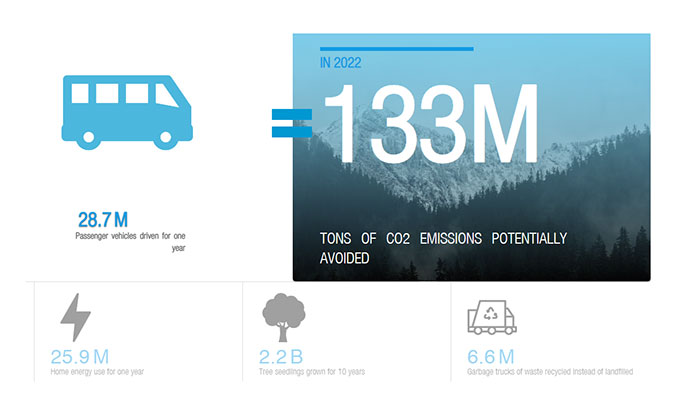
UNIDO delivers technical assistance to developing countries to help them comply with their obligations under the Montreal Protocol – a global environmental agreement created to safeguard the ozone layer and protect our planet, which came into force in 1989.
UNIDO enables the transformation of industries, especially the refrigeration, air-conditioning and foam sectors, while ensuring countries’ compliance with Montreal Protocol phase-out targets. “We work with industries, governments, and institutions to find sustainable alternatives to controlled substances. We also substitute each ton of ozone-depleting substances (ODS) with a less harmful substance or a new process; thereby have a tangible impact on the national, regional and global levels,” Nielsen explained.
The Montreal Protocol has a rich and inspiring history and considered as one of the examples of effective multilateral cooperation. By 2015, all Parties to the Montreal Protocol had successfully phased out chlorofluorocarbons (CFCs), Halons and other harmful substances as outlined in the treaty. These substances formed the critical elements in major industrial sectors. Phasing-out these substances required coordinated global efforts.
Since 2010, UNIDO has implemented 134 stages of hydrochlorofluorocarbons phase-out management plans (HPMPs) in 79 countries. Under the HPMPs, UNIDO has supported more than 400 enterprises in changing their production models to ensure that their manufacturing processes and products have a less harmful impact on the environment.
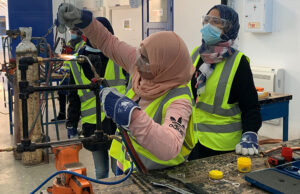
Women technicians in the Refrigeration and Air Conditioning sector being trained under the Montreal Protocol projects.
With the adoption of the Kigali Amendment to the Montreal Protocol in 2016, the 198 Signatory Parties committed to cut the production and consumption of hydrofluorocarbons (HFCs) by more than 80 percent over the next 30 years. This strengthens the ambitions of the Montreal Protocol and brings the treaty closer to the Paris Agreement. UNIDO is working to help countries ratify the Kigali Amendment and design their national Kigali HFC Implementation Plans to achieve further sustainable industrial transformation for the good of people and the planet.
Read this story on UNIDO Website
CONTACT US
Subscribe to our newsletter
Sign up to receive a quarterly email with updates and new content!
Disclaimer
The information presented in this newsletter does not necessarily reflect the views of UNIDO. Links to external websites are included solely to provide additional information and do not imply any official endorsement of the opinions, ideas, data, or products presented.
© 2023 UNIDO Montreal Protocol
